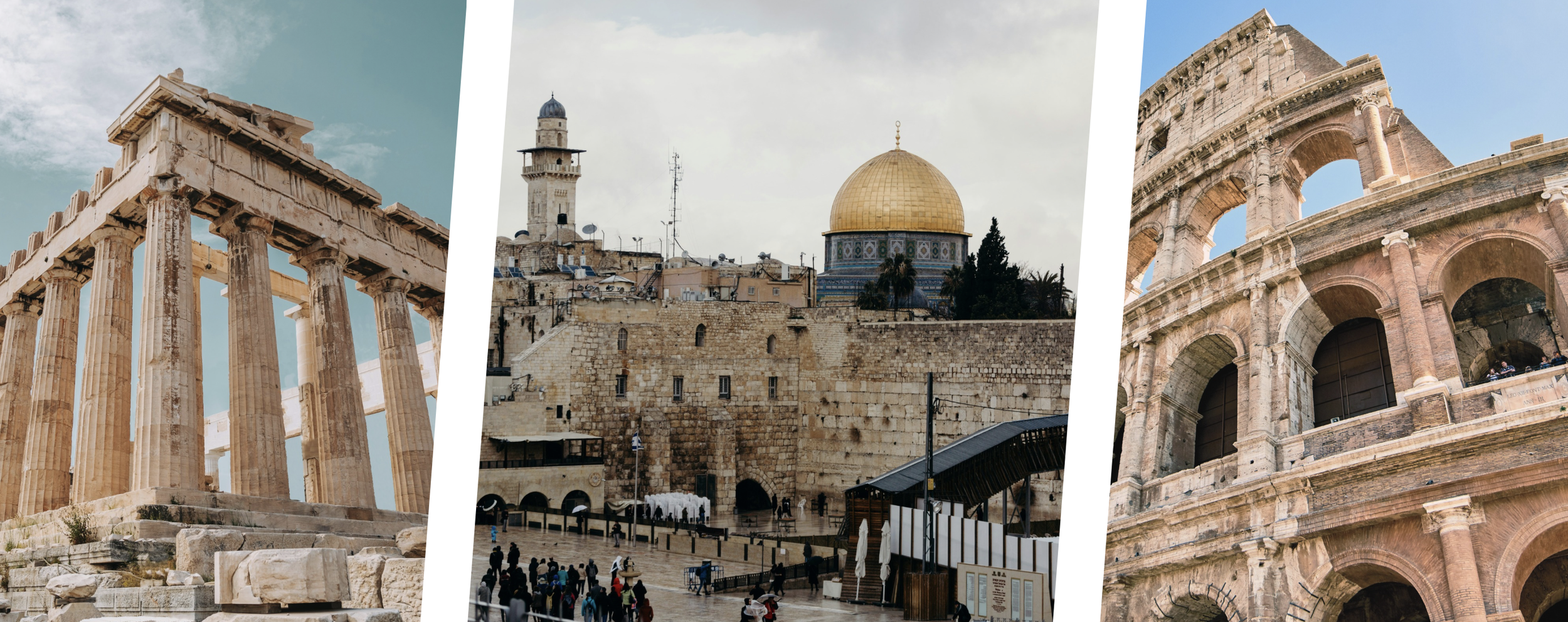The Compass That Crumbled:
Unraveling the West’s Soul
How Athens, Rome, and Jerusalem Shaped Us—and Why October 7th Exposed the Fracture
The West used to stand for something that made sense. Growing up, I didn’t fully grasp it—vague mentions of democracy or justice floated around, just background noise. Then October 7th hit. I was in Tel Aviv, sirens screaming, as Hamas killed 1,100 people, took 251 hostages, and the world flipped.
First thing to know: the West stands on three legs—Athens gave us one piece, Rome another, and Jerusalem the glue holding it together. Yet here we are, watching people cheer for Hamas, hate on Israel, and trash the very values that built the free world.
Athens: The Brain of the West
Start with Athens, around 500 BCE. This Greek city gave the West its first big idea: reason. Thinkers like Socrates, Plato, and Aristotle didn’t just sit around—they asked hard questions. “What’s justice? What’s true?” Socrates wandered the streets, pushing people to dig into themselves, saying, “I only know I don’t know anything.” Plato dreamed up ideal societies; Aristotle argued everything’s got a purpose—like justice holding a city together.
They birthed democracy, too. Athens and its fellow city-states—Sparta and others—let regular folks vote, argue, and decide. It wasn’t perfect; slaves and women got no say. But it was a shift: power wasn’t just for kings anymore. Reason ruled.
After October 7th, I thought this Athenian logic would kick in. Israel’s a democracy—tiny, 22,000 square kilometers, surrounded by an Arab world spanning 13 million square kilometers. Rockets flew, hostages were taken, 1,100 died—reason says that’s wrong. Justice says you don’t let it slide. Instead, I saw crowds around the world and online twisting facts, cheering Hamas. Reason’s gone quiet.
Rome: The Muscle of Order
Next up, Rome. If Athens gave the brain, Rome built the muscle—law and order that made ideas stick.
Traditionally founded in 753 BCE, Rome hit its stride by 500 BCE. By 27 BCE, it was an empire stretching from Spain to Judea. They ditched kings for a Republic in 509 BCE—senators and assemblies ran the show—then went full empire under Augustus. Law was their thing: the Twelve Tables in 450 BCE set rules in stone—steal, you pay. By 530 CE, Justinian’s Corpus Juris Civilis codified centuries of justice—trials, rights, order.
Rome built to last—roads and aqueducts stretching far. At its peak under Trajan in 117 CE, it spanned 5 million square kilometers. They ruled Judea, too—trashed our Temple in 70 CE, exiled us after 135 CE—but their law shaped the West. Cicero, around 100 BCE, said laws should protect, not just dominate.
Post-October 7th, I thought Rome’s legacy would hold. Israel’s fighting chaos—16 million Jews, 0.2% of the world, against a Goliath of a region. Hamas breaks every rule; we’re the ones keeping order. But no—people call Hamas “resistance,” not lawless killers. Rome’s spine feels missing.
Jerusalem: The Heart of It All
Here’s where it gets real: Jerusalem, the heart. Athens gave reason, Rome law—Jerusalem gave the why. Around 1000 BCE, King David made it Israel’s core; Solomon built the First Temple in 957 BCE. The Torah’s rules—“don’t kill, don’t steal, love your neighbor”—started there, long before Greece or Rome.
Rome smashed the Second Temple in 70 CE, but Jerusalem’s pulse kept beating. Then Jesus, a Jew from Judea, preached hope and forgiveness around 4 BCE. His apostles spread it; Rome’s roads carried it. By 313 CE, Constantine’s Edict of Milan greenlit Christianity; Theodosius locked it in by 380 CE. Jerusalem’s Judeo-Christian values—every life matters, justice has soul—sank into the West.
Saint Augustine tied it tighter. Around 354–430 CE, as Rome fell, he blended Plato’s ideas with faith, arguing truth and goodness come from God, not just human effort. That moral core shaped the West I grew up in—“land of the free” wasn’t just a slogan.
After October 7th, I thought it’d click. Israel’s defending itself—Athens’s logic, Rome’s order, Jerusalem’s heart should say, “Stand with the innocent.” Instead, I heard “from the river to the sea” chants all around the world, saw online mobs call Hamas heroes. They’re trashing the compass—Jerusalem’s soul—that built them.
The Drift We Can’t Ignore
This isn’t abstract—it’s personal. October 7th woke me up. Israel’s tiny—0.2% of humanity, a 3,000-year torch still burning. The West’s tripod—Athens’s brain, Rome’s muscle, Jerusalem’s heart—should point to us, defending our home. But it’s spinning wild. If this drift keeps up, letting radical ideologies drown out that traditional compass, the free world’s done.
It’s not “coming”—it’s here. Crowds backing Hamas aren’t far-off radicals; they’re in the West now. We’ve got to fight that, or the foundations crumble. What’s left when the compass breaks?
